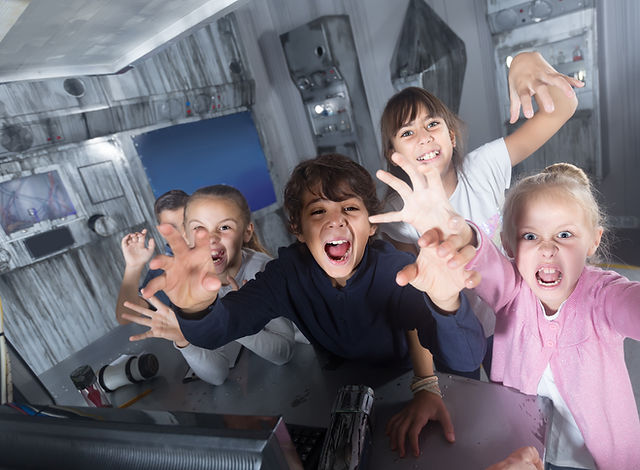Escape rooms have become more than just a passing trend; they have evolved into a captivating form of immersive entertainment that challenges both the intellect and creativity of participants. In the maze of themed puzzles and cryptic clues, the world of escape rooms offers an intriguing blend of adventure and problem-solving. Let’s delve into the depths of this immersive phenomenon and explore the myriad aspects that make escape rooms a compelling experience.
The Artistry of Escape Room Design
The allure of escape rooms lies not only in the challenge of solving puzzles but also in the meticulous design that brings these challenges to life. Each room is a canvas where creators paint intricate puzzles, weaving together thematic elements and storylines to immerse participants in a world of mystery. The artistry involved in crafting these puzzles showcases the creators’ ingenuity, turning escape rooms into a form of interactive art.
Decoding the Psychology of Escape Rooms
The heart-pounding thrill of racing against the clock to unravel mysteries is more than just a test of wit; it’s a psychological adventure. Escape rooms delve into the intricacies of human behavior under pressure, testing participants’ problem-solving skills and resilience. Moreover, the emphasis on teamwork and communication adds a layer of complexity, requiring participants to decode not only puzzles but also the dynamics of collaboration.
Escape Rooms and Cognitive Skills
Engaging in escape rooms isn’t merely a recreational activity; it’s a workout for the mind. The puzzles incorporated into these experiences serve as mental challenges that sharpen cognitive abilities. The analytical thinking, attention to detail, and quick decision-making required in escape rooms extend beyond the themed scenarios, contributing to the enhancement of practical problem-solving skills in everyday life.
The Evolution of Escape Room Themes
Escape rooms have transcended traditional mystery settings. Today, participants can find themselves transported to various realms, from historical periods to futuristic landscapes. The evolution of themes adds a layer of excitement and unpredictability, ensuring that escape rooms cater to diverse interests and preferences, making the experience not just challenging but also highly engaging.
Escape Rooms as Team Building Exercises
The collaborative nature of escape rooms extends beyond entertainment; it serves as a powerful tool for team building. Groups of participants must work together to conquer challenges, fostering communication, trust, and synergy. The lessons learned within the confines of an escape room often translate seamlessly into improved teamwork in professional and social settings.
The Rise of Virtual Escape Rooms
In an era where virtual experiences dominate, escape rooms have adapted to meet the demands of the digital age. Virtual escape rooms offer a unique set of challenges, providing participants with an immersive experience from the comfort of their homes. While the transition from physical to virtual poses its challenges, it opens new avenues for a broader audience to partake in the thrill of escape rooms.
DIY Escape Rooms at Home
For those seeking a more personalized experience, the trend of creating escape rooms at home is gaining momentum. Designing puzzles, crafting narratives, and transforming living spaces into immersive challenges showcase the creativity and resourcefulness of enthusiasts. DIY escape rooms offer a unique opportunity for individuals to curate experiences tailored to their preferences.
Community and Culture of Escape Room Enthusiasts
Beyond the confines of escape rooms, a vibrant community of enthusiasts has emerged. From events and forums to online platforms, enthusiasts share their experiences, tips, and recommendations. The sense of camaraderie among escape room aficionados creates a supportive culture that extends the enjoyment of the experience beyond the game itself.
Sustainability Themes in Escape Rooms
In response to growing environmental consciousness, some escape rooms are incorporating sustainability themes into their designs. From eco-friendly puzzles to narratives centered around environmental conservation, these experiences not only entertain but also raise awareness about pressing global issues. The integration of sustainability into escape rooms serves as a testament to the adaptability of this form of entertainment, reflecting the broader societal shift towards eco-consciousness. Participants find themselves not only escaping fictional scenarios but also engaging with real-world challenges, fostering a sense of responsibility and environmental mindfulness within the immersive adventure.
Conclusion
In the world of escape rooms, the thrill of unlocking secrets and conquering challenges knows no bounds. From the artistry of design to the psychology behind the puzzles, each element contributes to an experience that goes beyond entertainment. Whether in physical or virtual realms, as a team-building exercise, or a solo adventure at home, escape rooms continue to captivate and challenge, offering a unique blend of adventure and intellectual stimulation for all who dare to enter. Embark on this immersive journey, and discover the myriad facets that make escape rooms an unforgettable experience.





